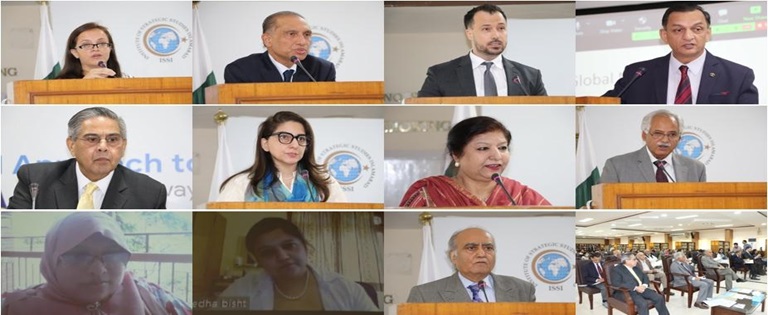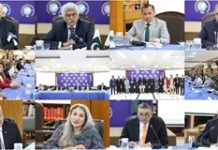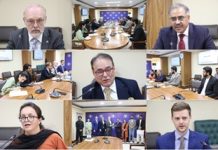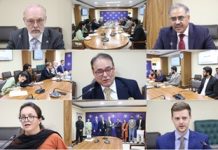PRESS RELEASE
“A Regional Approach to Transboundary Water Issues:
Pathways and Challenges“
April 14, 2022

The Centre for Strategic Perspectives (CSP) at the Institute of Strategic Studies Islamabad (ISSI) organized a seminar titled, “A Regional Approach to Transboundary Water Issues: Pathways and Challenges,” in collaboration with the Hanns Seidel Foundation (HSF) Pakistan. The seminar had two working sessions. Session I was titled ‘Trans-boundary Water Issues in South Asia” and the speakers of the session included Dr. Hassan Abbas, Founding Chairman, ZiZAK; Dr. Medha Bisht, Senior Assistant Professor, IR, South Asian University, New Delhi; and was moderated by Dr. Muhammad Ashraf, Chairman, Pakistan Council for Research in Water Resources, Islamabad. Similarly, Session II was titled “Water Security Challenges in the Region” and the speakers included Dr. Sara Nowreen, Associate Professor Bangladesh University of Engineering and Technology; and Dr. Shaheen Akhtar, Professor IR, National Defence University, Islamabad and Chair of the session is Mr. Ali Tauqeer Sheikh Former CEO, LEAD, Pakistan.
In her introductory remarks, Dr Neelum Nigar Director, CSP stressed on the need of regional cooperation to tackle the issue of water in South Asia. While in his welcome remarks, Ambassador Aizaz Ahmed Chaudhry, Director General ISSI highlighted the challenges due to climate change and water mismanagement and stressed that water is increasingly becoming a source of conflict due to transboundary and water-sharing reasons. Dr. Steffen Kudella, Country Director, HSF in his opening remarks stated that there is an alarming decrease in usable water in South Asia and Pakistan is no exception to this as it is becoming the most water-stressed country in the world.
In the Working Session 1, the first speaker , Dr. Hassan Abbas emphasized on the challenges, pathways and the unsustainable development models applied to manage water. Dr. Abbas opined that the models that are used are structurally heavy with minimum regard to socio-economic consequences; instead of appreciating and working with models that use cooperation as a tool over confrontation. While the second speaker, Dr. Midha Bisht highlighted that the model that is currently applicable in the case study of Pakistan is that of a cooperative antagonist, whereas, the model should be such that focuses on relationality over rationality for a sustainable future course. In concluding the session, the hair reiterated the need to move beyond the rational to a more relational approach and move from confrontation to cooperation while we deal with transboundary water issues to gain maximum mutual benefit which not only helps to promote good relations but also helps the water itself and the ecology surrounding it to thrive and survive.
In the Working Session II, Dr. Shaheen Akhtar in her presentation highlighted the issues related to water security and assessed the lack of Pakistan’s water security. She further flagged the correlation of economy and agriculture with water security as well as hydropower potential in the region and touched upon the unsustainable management practices and mounting environmental pressures. Dr. Nowreen in her remarks shed light on issues and challenges related to surface and groundwater as well as climate change effects in Bangladesh. She stated that Bangladesh is facing an increase in groundwater decline along with other major water-related challenges including drought, waterlogging, salinity, cyclone, flash floods and landslides. In concluding the session the chair echoed the concerns raised by the speakers and stated that the domestic water agenda is linked with regional water discourse. Equally imperative is the need for research and scientific studies by people involved in the Indus Water Treaty (IWT) between India and Pakistan.
In conclusion, while reflecting on the proceedings of the seminar, Ambassador Chaudhry stated that the IWT mechanism has worked and has remained working even through wars and confrontation. However, the challenges today demand a different approach to fully utilize the potential of water for mutual benefit. Ms. Meher Ghawas, Head of Program Management, HSF, Pakistan in her concluding remarks recapitulated the importance of good and sustainable water management and governance especially if it’s a shared resource. In the end, Ambassador Khalid Mahmood, Chairman Board of Governors presented his Vote of Thanks.












